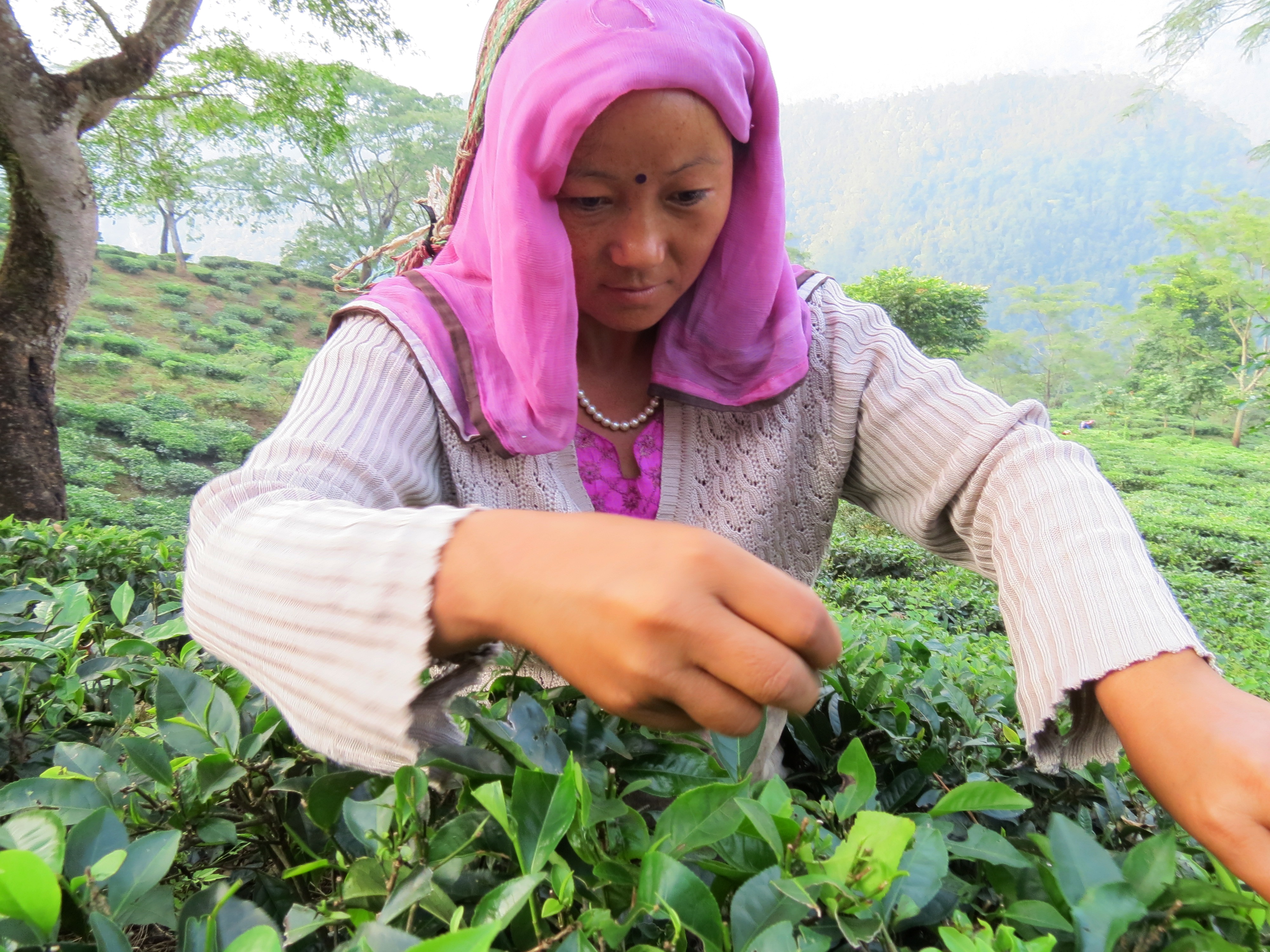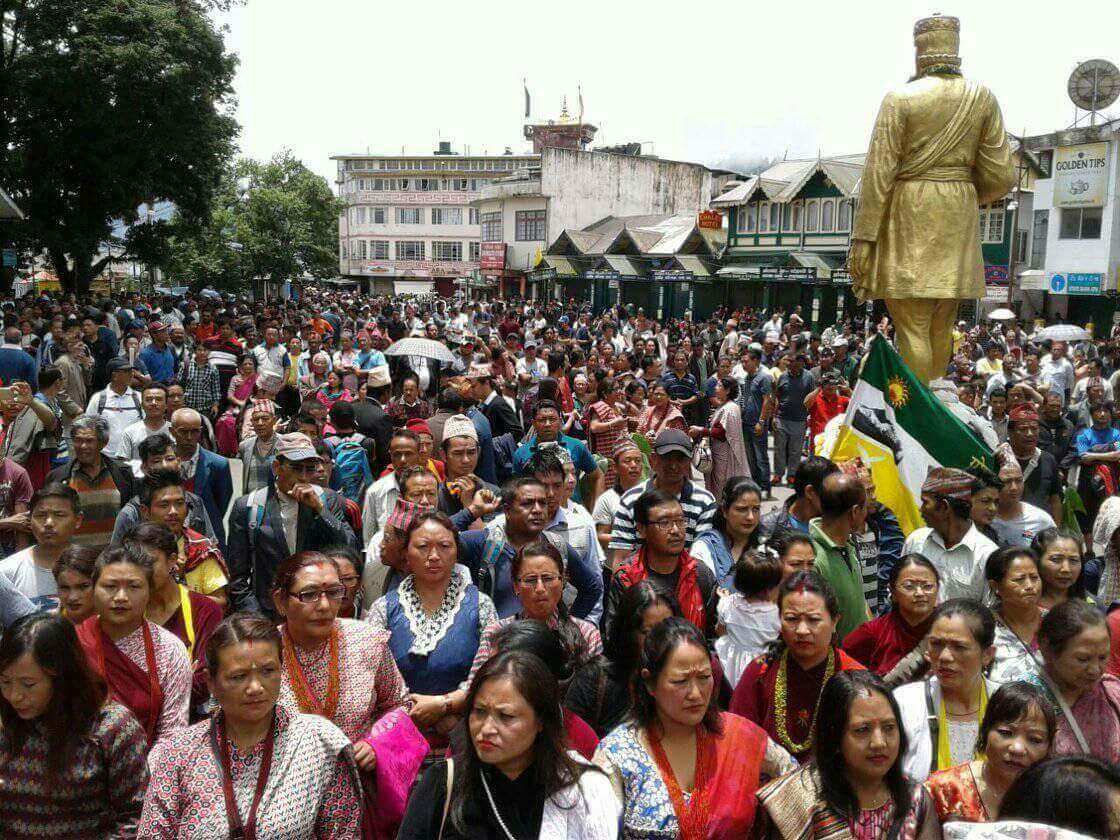
Internet service in the Darjeeling Hills was disabled June 19 and service providers remain under orders not to allow online communication through July 25. The order is a security precaution to pre-empt organizers from coordinating protests throughout the region from Siliguri to Sikkim and north to the border with Nepal.
DARJEELING, West Bengal
Residents near the Sadar police station in Darjeeling normally file 30 complaints a day, mostly for petty crimes. Not a single complaint has been filed since June 9, shortly after hundreds of thousands of Gorkha began a strike for statehood now in its 33rd day.
Residents are keeping their distance from local police and riot-clad members of the Central Reserve Police Force (CRPF) following weeks of unrest in which seven people have died and hundreds more, including police, were seriously injured. Heavily armed CRPF were deployed to Darjeeling, Kalimpong, and Sonada on July 14. There are 11 CRPF companies now in place in the region but they are not under siege. In most cities, police stand watch over peaceful gatherings.
Headlines worldwide portrayed the violence with a reminder of the 1,200 killed during similar uprisings from 1986 to 1988.
Residents describe a different story.
Allan Rai is a 20-year-old studying tea management. He asked that his location and personal details remain private at this time.
The protests are orderly and residents are determined to prevail, he writes.
“On reading your recent article as well as sharing it with a few of my companions, we felt that the information you were provided was quite biased and portrayed only one side of the story,” writes Rai.
The article he is referring to appeared in World Tea News under the headline: Darjeeling Uproar Disrupts Tea Operations.
He counters with these points supporting the Gorkha protest:
- Firstly, the ongoing movement is a mass movement not adhering to any political party. The common people of the entire region are supporting the demand for a separate state irrespective of their caste, creed, religion, and other differential status. The Gorkhas from different parts of India as well as those across the world have come in support for Gorkhaland.
- With regards to the strike being held off for 12 hours on the auspicious occasion of Eid, our Muslim brothers and sisters are in solidarity for our demand for Gorkhaland and were willing to continue with the strike even on the day of their festival.
- Approximately 70% of people in Darjeeling and adjoining areas of Doars depend on income from tea plantations directly or indirectly. In almost all the tea factories, 99% of the workers are the natives i.e., the Gorkhas. A separate state is the aspiration of each individual worker in these factories.
- Tea workers were protesting for the minimum wage act, which has not been implemented in Darjeeling and Dooars. The Gorkhaland movement began stirring among tea workers who fully support the movement for a separate state. They even carry their lunch from home and actively participate in the rallies every day.
- The movement would not have gained such vast momentum if it were not for social media. Not only the Gorkhas, but people from other communities in India and from several parts around the globe are in solidarity for the cause of Gorkhaland.
- Gorkhaland is not a separatist movement, unlike Kashmir where they are demanding a separation from the nation entirely. Our movement is for a separate state within the Indian nation for the cause of our IDENTITY and DIGNITY that has been denied to us for the past 110 years.
- The movement here is rather democratic and apolitical. The only visible violence is the atrocities committed by the Bengal Government by ordering forces to charge and fire bullets at peaceful protestors in broad daylight.
- The violence on June 17 that claimed four innocent lives was due to a clash between the protestors and the armed forces. This was because on previous days these armed forces charged women and elders who were peacefully protesting. On June 16 police raided the house of the Gorkhaland Territorial Administration (GTA) chief. The media flashed that they found weapons and explosives when all that they found was an archery kit that was for training school children, agricultural tools and other traditional weapons along with two cartons of fire crackers. The media termed these “weapons and explosives.” This led to a massive rally in Darjeeling. When the armed forces tried to intervene, it led to a clash and resulted in the death of the four martyrs.

The Current Situation
Each day thousands of tea workers from the fields join city residents at a now-familiar 10 a.m. gathering at the historic Darjeeling train station. They rally, tour the city along Mall Road and end their protest at Chowk Bazar. Some groups chant in front of the magistrate’s office. Groups of 500 to 2,000 listen as speakers from the organizing bodies address the crowd for about an hour before dispersing.
There is nothing much else for locals to do. The tea gardens are closed, the factories idle. The tourists are too scared to stay, schools are closed, outdoor sporting events canceled. Restaurants, pubs, shops, and grocers as well as banks and ATMs are locked to prevent looting, according to the Times of India.
Residents report that each day you see the same faces whether the march is for the GJM (Gorkha Janmukti Morcha), the GNLF (Gorkha National Liberation Front), the ABGL (Akhil Bharatiya Gorkha League) or the CPRM (Communist Party of Revolutionary Marxists). All support the effort to establish Gorkhaland, a state carved from the upper reaches of West Bengal.
The scene is familiar to travelers. In January in Chennai tens of thousands of protestors expressed their outrage over the ban of a traditional bull-taming contest known as jallikattu. The sport was continued.
Five years ago, thousands in Darjeeling took to the streets to peacefully protest the expansion of 50 Wal-Mart locations across India. I missed a flight to Kolkata due to the resulting congestion in every village along the 60-mile road to Bagdogra Airport. There are many names for the protests which draw the people of India into the streets carrying signs and chanting. Nationwide a cessation of work is know as a hartal. Locally these strikes are called anishchitkal bandh (indefinite strike).
One key difference is the interruption of the internet, which has choked off contact with the Gorkha. The Hindu reports this decision has led to widespread resentment, which is being tapped into by the movement. On Monday the GJM marched to the magistrate’s office demanding that internet service be restored.

Dangerous Precedent
“This movement is not a sudden, it has been prevalent for 110 years, however, it was highly voiced out during the year 1986 under the leadership of late Subash Ghising,” writes Allan Rai.
“During the ongoing agitation in those days my father was among the activists for the cause of Gorkhaland. The movement turned out to be violent, killing 1,200 innocent civilians as well as injuring many. Despite this violence the demand for Gorkhaland was not fulfilled,” he writes.
“Instead they settled with the Darjeeling Gorkha Hill Council (DGHC), a semi-autonomous body to look after the administration in the hills. This granting of autonomy led the masses to believe that now the hills would see better administration and development,” reports Rai.
Here is an excerpt from my upbeat report at the time:
“A new territory was carved from West Bengal’s Darjeeling district but India rejected demands for a separate state. The Gorkhaland Territorial Administration (GTA) will have powers to manage public works, social welfare, health and forests and agriculture including valued tea gardens. Existing land records will be transferred to the authority
“The agreement will end the violence in the hills of Darjeeling and pave the way for development,” newly elected West Bengal Chief Minister Mamata Banerjee told the crowd of joyous Gorkhas gathered in the village of Pintail. She praised the signing as historic. “There is nothing to fear… Bengal is not being divided. Darjeeling is close to our heart,” she said.
“There will be an elected local body, there will be schools, colleges, hospitals, jobs will be available and Darjeeling will shine,” said Banerjee who shared her vision of Switzerland as a model.
Autonomous Region Fails
“The autonomy status was just a farce and the state still continued to intervene and rule over the region, depriving it of the development it deserved,” according to Rai. “I’ve been well acquainted with this movement. Since I was a child, I heard stories about the agitation of 1986, which our loving elders referred to as the most devastating “chyassi ko andolan” one of the biggest and most violent movement in the history of Gorkhaland,” he continues.
Protests soon resumed, often involving garden workers, with frequent strikes disrupting tea production and reducing productivity.
Tensions are greater now than at anytime since the bloodshed of the 1980s.
“The agitation which has been going on for over one month will turn terrible and it will be a decisive battle for our independence,” GJM Chief Bimal Gurung told reporters Saturday night. “If I need to shed my blood I am ready to do that, but the fight will go on till Gorkhaland is achieved,” Gurung said.
So, Why Gorkhaland?
“Darjeeling tea is our pride and our heritage,” writes Rai. “It has been one of the world’s leading brands of tea. However, the tea plantations and factories in the region do not flourish or prosper to their full potential due to several reasons, one of them being inequitable distribution of monetary resource. The revenue collected from the Darjeeling tea does not return to those who produce it. Thus, there is not much monetary support to maintain the factories and the wages of the workers are very low compared to the wages of workers in other states of our country,” he writes.
“Workers are provided with facilities such as PF, Pensions that do not even amount to $15.50 (INRs1000) per month and medical facilities that are mentioned in the documents for name sake as there are no medical units or hospitals. Owing to these factors many factories in the region have been shut down. This has led to widespread unemployment resulting in deaths due to starvation as well as depression,” he said.
“When visiting tea estates, people usually meet the owners and managers of these estates. This leads them to understand only the owner’s or the manager’s point of view regarding the estates. However, they often fail to consider the daily wage workers of the estate and fail to understand or even consider the terms or the conditions in which they work to earn their minimal standard of living.
I’m sure when people drink our Darjeeling tea they sip it in delight but has anyone thought about the condition of the old lady in the garden who plucked those luscious leaves with her delicate hands? Or the ever-smiling man who turns these tea leaves into an aromatic sipping delight? Has anyone thought that even under these extreme and crucial conditions these simple workers do not fail to do their job and supply us with our world-famous brand of tea?
“The people of this region are very hardworking and generous, they work 8 hours a day for a meager amount of $2 (INRs130) per day. These workers are living in such harsh conditions yet has anyone even bothered to think about them? These are the things that one must ponder upon to realize the potential that the tea plantations will reach, if, a separate state is formed,” he concludes.
Sources: World Tea News, The Hindu, Indian Express
Next, Gorkhas speak in support of their cause:


One response to “Darjeeling Silence is Deafening”
For Gorkaland all the way, please share! Indian needs to provide Gorkaland for Darjeeling Tea!!! Gorka Darjeeling Tea, Gorka Darjleeing Tea, Gorka Darjeeling Tea!!!